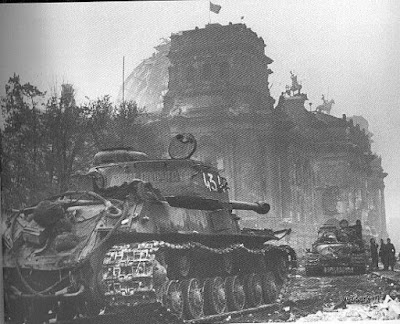
 FROM THE BBC
FROM THE BBCStalin's attempt to take Berlin ahead of his allies in 1945, led to the death of 70,000 Russian soldiers. Tilman Remme followed historian Antony Beevor as he examined the conquering army's conduct, and unearthed evidence that might explain why the Soviet leader took such risks.
Germany 1945
On 2 May 1945, after one of the most intense battles in human history, the guns at last stopped firing amongst the ruins of Berlin. According to Soviet veterans, the silence that followed the fighting was literally deafening. Less than four years after his attack on the Soviet Union, Hitler's self-proclaimed thousand-year Reich had ceased to exist. The German Führer himself was dead.
Europe would never be the same again. Despite years of Cold War tension, the continent would remain free of war for decades to come, unprecedented in European history. Crucially, by the time that Germany re-emerged as a single and united nation in 1990, the megalomania that had brought death and destruction to the continent in the first half of the century had been well and truly purged.
But the human cost of the battle for Berlin had been enormous. Millions of shells were fired into a city that was already devastated after two years of relentless bombing raids by British and American warplanes. Nearly a quarter of a million people died during the last three weeks of World War Two, almost as many as the United States lost during the entire war.
The battle of Berlin has never been told from the point of view of the ordinary Russian soldier ...
Some 54 years after the war, the acclaimed British military historian, Antony Beevor, embarked on one of the most ambitious projects of his career. His aim was to discover new material on the battle for Berlin, following the success of his award-winning book on the battle of Stalingrad.
'The battle of Berlin has never been told from the point of view of the ordinary Russian soldier,' Beevor said when I first interviewed him in 1999. 'Nor has it been told from the point of view of the revenge they took on the population of Berlin when they captured the city.'
 Beevor's research
Beevor's researchThere were tens of thousands of unexplored documents in the Russian archives relevant to the Battle of Berlin. Would the new material shed light on controversial issues such as the alleged mass rape of German women by Red Army soldiers?
Why did Stalin sacrifice the lives of tens of thousands of his soldiers in order to be in Berlin before the Americans? After all, he was already committed to sharing the city with his Western allies after the war.
Our first filming trip to Germany took us to the river Oder, 60 miles east of Berlin. In April 1945, over two years after the German defeat at Stalingrad, the Oder and its tributary, the Neisse, had become the front line between Nazi Germany and the Soviet Union. Two and a half million Red Army troops, 6000 tanks and over 40,000 artillery pieces were deployed for the final onslaught against the German capital.
The German resolve to fight was largely due to fear of Russian retributions.
In contrast, the German armed forces, the Wehrmacht, was a shadow of its former self. But its 300,000 German troops were determined to hold out against the vastly superior Red Army. The German resolve to fight was largely due to fear of Russian retributions. Since 1941, Nazi forces had laid waste to large parts of the Soviet Union. More than 23 million Soviet soldiers and civilians had died. Fuelled by Nazi propaganda, the Germans were terrified of what would happen if Berlin fell into Soviet hands.
RELATED ARTICLES---
-- Pictures: Russians enter Berlin: WW 2: Part 1
-- Russians enter Berlin: Part 2
-- Russians enter Berlin: Part 3
-- Russian army enters Berlin: Part 4












